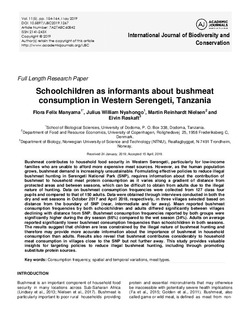Schoolchildren as informants about bushmeat consumption in Western Serengeti
Journal article, Peer reviewed
Published version

Åpne
Permanent lenke
http://hdl.handle.net/11250/2639516Utgivelsesdato
2019Metadata
Vis full innførselSamlinger
- Institutt for biologi [2612]
- Publikasjoner fra CRIStin - NTNU [38679]
Originalversjon
International Journal of Biodiversity and Conservation. 2019, 11 (5), 154-164. 10.5897/IJBC2019.1267Sammendrag
Bushmeat contributes to household food security in Western Serengeti, particularly for low-income families who are unable to afford more expensive meat sources. However, as the human population grows, bushmeat demand is increasingly unsustainable. Formulating effective policies to reduce illegal bushmeat hunting in Serengeti National Park (SNP), requires information about the contribution of bushmeat to household meat protein consumption as it varies along a gradient of distance from protected areas and between seasons, which can be difficult to obtain from adults due to the illegal nature of hunting. Data on bushmeat consumption frequencies were collected from 127 class four pupils and compared to that of 150 adults. Data were obtained through interviews conducted in both the dry and wet seasons in October 2017 and April 2018, respectively, in three villages selected based on distance from the boundary of SNP (near, intermediate and far away). Mean reported bushmeat consumption frequencies by both schoolchildren and adults differed significantly between villages declining with distance from SNP. Bushmeat consumption frequencies reported by both groups were significantly higher during the dry season (66%) compared to the wet season (34%). Adults on average reported significantly lower bushmeat consumption frequencies than schoolchildren in both seasons. The results suggest that children are less constrained by the illegal nature of bushmeat hunting and therefore may provide more accurate information about the importance of bushmeat in household consumption than adults. Results also reveal that bushmeat contributes considerably to household meat consumption in villages close to the SNP but not further away. This study provides valuable insights for targeting policies to reduce illegal bushmeat hunting, including through promoting substitute protein sources.
